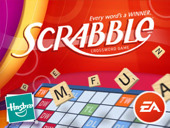By Brad Cook
You contemplate the letters before you: G, I, I, D, A, S, and Q. Somewhere on the board is the perfect spot to use that coveted 10-point Q. You suddenly realize where: at the intersection of “INVADER” and “YIN.” With a “Q” and an “S,” you spell “QI” (a variant on the Chinese word “chi”) and “QIS” (the plural of “qi”). Thanks to a Double Letter score, you pick up 21 points for the former and 22 points for the latter. Not bad for one round of gameplay.
Never mind a board, a bag full of tiles, a dictionary, and a pad of paper; now you can carry all of that on your iPod with Scrabble. Pull a quick game out of your pocket any time, anywhere and match wits against up to three other players or the computer, with three levels of difficulty available. The game tracks your historical statistical achievements, including your highest-scoring game, your best word and best turn, your wins, losses, and ties, and your career number of bingoes (using all seven tiles in one turn).
All the Amenities of Real World Scrabble
Scrabble on the iPod also features a built-in dictionary, so it can automatically decide the validity of any word placed on the board without an argument ensuing between human opponents. Four times per game, you can ask the computer to figure out your best word combination, based on your tiles and the board’s layout, and then decide whether or not to accept it. As in real world Scrabble, you can exchange some of your letters for new ones (earning zero points for that turn) and shuffle your tiles to see if they spark a new combination.
In addition, you can play the game different ways, such as opting for duplicate rules, in which each player submits their best word from the same rack of letters. The one with the highest score gets placed on the board and that player earns the points; all players involved in a tie get the points. In addition, you can play to a limit of 75 or 150 points or to a maximum of 8 or 12 rounds.
Now if you’ll excuse us, there’s another multi-word turn awaiting us, and it will take advantage of a triple word score.
Once There Was a Game Called Lexiko: A History of Scrabble
The next time an economic downturn rears its head, think of unemployed architect Alfred Butts, who found himself with nothing to do after being laid off in 1931, at the height of the Great Depression. Realizing that few word-based games existed, he began work on one he called Lexiko. He examined newspapers, magazines, and the dictionary to figure out how often letters occurred in the English language, weighting the number of tiles in the game accordingly. Lexiko didn’t use a board, relying only on the players’ ability to form words from the nine tiles they each held.
After receiving rejections from all of the game companies, Butts tried again with Criss-Cross Words, which assigned points to the letters based on their frequency, reduced the number of tiles per player to seven, and added a board that included spaces for doubling or tripling the value of a letter or word. Butts failed once more to generate any interest in his game, however, and in 1947 he turned over manufacturing of the game to James Brunot, in exchange for a royalty on each set sold.
Brunot tweaked a few rules and changed the name of the game to Scrabble. He too struggled to sell many sets until a fateful day in 1952, when Jack Strauss, the chairman of Macy’s, placed a large order after discovering that his stores didn’t sell the game, which he had played while on vacation. Brunot sold over a million copies the following year, and Scrabble quickly became one of the most popular board games in history.
Today, Scrabble is played by millions around the world, with tens of thousands vying competitively in tournaments that include the World Scrabble Championship, which happens every other year. In 2001, one such player, Stefan Fastis, wrote in his book “Word Freak: Heartbreak, Triumph, Genius, and Obsession in the World of Competitive Scrabble”: “Perfection isn’t arrived at overnight, and the more I play, the more Alfred’s game seems perfect … The game is a carefully choreographed pas de deux, a delicate balance between risk and reward.”
iPod Games FAQ
Do you have questions regarding any of the iPod games available from the iTunes Store?

Double Trouble For Your Opponent. Double Word and Double Letter bonuses on your first turn. Well played.
- Site: Scrabble
- Publisher: Apple Inc.
- Developer: Electronic Arts
- Genre: Cards, Casino & Board Games
System Requirements
- Mac OS X version 10.3.9 or Windows 2000
- iPod nano (3rd and 4th generation only), iPod classic, or iPod (5th generation only). Not playable on your computer, other iPod models, iPod touch or iPhone. Please check which iPod model you have.
- iTunes 7.5 or higher required to download (games cannot be played in iTunes)

